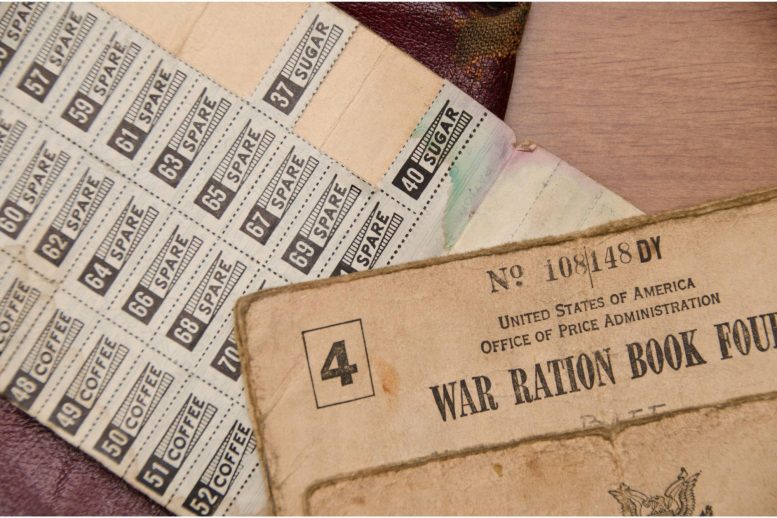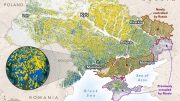
Rationing is a system of controlled distribution of limited resources, goods, or services during a time of shortage or emergency. It is usually implemented by governments during war or economic crises to ensure that essential goods and services are fairly distributed among the population.
According to new research from the University of Leeds, adopting a World War II-style rationing system could be a viable solution in reducing carbon emissions.
Academics have presented their argument in a paper published in the journal Ethics, Policy and Environment, stating that rationing could be a means of rapidly and fairly reducing greenhouse gas emissions by states.
The researchers claim that alternative schemes, such as carbon taxes and personal carbon trading, which have been considered by policymakers to reduce emissions, tend to benefit the wealthy as they have the means to purchase the right to pollute if trading were permitted.
The authors argue that carbon rationing would instead allow people to receive an equitable portion of resources based on their needs, therefore sharing out the effort to protect the planet.
The authors were based across the University of Leeds’ Inter-Disciplinary Ethics Applied Centre, Sustainability Research Institute, and School of History when they conducted the research.
Joint lead author Dr. Nathan Wood, who is now a Postdoctoral Fellow at Utrecht University’s Fair Energy Consortium, said: “The concept of rationing could help, not only in the mitigation of climate change, but also in reference to a variety of other social and political issues – such as the current energy crisis.”
Lessons from the past
Records from World War II show that compulsory food rationing was more acceptable to the UK public than voluntary changes to diet when resources became scarce. The policy aimed to share goods and burdens more equally, regardless of wealth, which was an important part of its popularity and success.
Historic rationing policies also introduced price controls on goods to keep key resources affordable for most people. As a result, rates of malnutrition went down during World War II, despite the shortages.
A key difference between World War II rationing and the climate crisis is public perception, the researchers say. The availability of thousands of garments, gadgets and goods at the click of a button can give the illusion that resources are available in abundance, but the reality is starkly different.
Dr. Rob Lawlor, joint lead author and Lecturer at Leeds’ Inter-Disciplinary Ethics Applied Centre, said: “There is a limit to how much we can emit if we are to reduce the catastrophic impacts of climate change. In this sense, the scarcity is very real.”
Dr. Wood said: “The cost of living crisis has shown what happens when scarcity drives up prices, with energy prices rising steeply and leaving vulnerable groups unable to pay their bills. Currently, those living in energy poverty cannot use anywhere near their fair share of energy supply, whereas the richest in society are free to use as much energy as they can afford.”
Dr. Lawlor added: “It seems feasible to reduce emissions overall even while the lowest emitters, often the worst off, may be able to increase their emissions – not despite rationing, but because of rationing and price controls.”
What equitable rationing could look like
The researchers suggest that rationing probably wouldn’t be the first step. Instead, policy changes could start with stricter regulations and an accompanying information campaign to communicate the benefits of rationing.
Initially, governments could regulate the biggest polluters, such as oil, gas and petrol, long-haul flights, and intensive farming, creating scarcity in products that harm the planet. Rationing could then be introduced gradually, to manage the resulting scarcity with the aim of meeting everyone’s basic needs.
The academics identified two options for rationing policy. Policymakers could introduce an all-encompassing carbon allowance, giving out ‘carbon cards’ like bank cards to track and limit usage. Alternatively, governments could ration specifically selected goods, such as flights, petrol, household energy, or even meat or clothing.
Dr Lawlor said: “Many have proposed carbon allowances and carbon cards before. What is new (or old, taking inspiration from World War II) is the idea that the allowances should not be tradable. Another feature of World War II-style rationing is that price controls on rationed goods would prevent prices from rising with increased demand, benefitting those with the least money.”
According to the researchers, it’s likely that rationing would accelerate the transition from fossil fuels to cleaner energy and more sustainable lifestyles. Dr. Wood said: “For example, rationing petrol could encourage greater use of, and investment in, low carbon public transport, such as railways and local trams.”
The researchers hope the paper will inspire policymakers to consider rationing as a serious option for fighting climate change.
Reference: “Rationing and Climate Change Mitigation” by Nathan Wood, Rob Lawlor and Josie Freear, 19 February 2023, Ethics Policy & Environment.
DOI: 10.1080/21550085.2023.2166342









What a great idea. Hey UK, get back to rationing!
A big Thank-You to the University of Leeds for this research. It will feature powerfully in right-wing news proving the new left-wing wants to control and destroy your life. They will tell you what you can and can’t have, and because the new definiton of equity trumps equality, someone else gets to have extra of what you need while you’re disallowed any.
Maybe the University, with its billion £ income and 1230 acres of land and over 180 buildings needs some rationing. Cut that down to 1 unheated building on 1 acre, and donate the yearly billion to a worthy cause instead, and then maybe we can talk about how we can both cut back. Except the University was founded by Edward VII, King of the British Dominions and Emperor of India, so it’ll be cancelled this year anyway.
I was born in 1940 in London UK & I remember war rationing quite well as a small child just after the war – what I do remember is the amount of effort my family & relatives put in to try & work around the rules – there were always reports of cheese or dried bananas or whatever suddenly being available somewhere, and all hell was then applied to the effort to ‘get’ said foodstuff. I was often sent with the money to buy something in a faraway store simply because it was suddenly discovered to be at that place. Some times things were ‘off ration’ so that would cause pandemonium ! People were very greedy buying up as much of something as they could & hoarding to try & foil the rationing. I think it brought out a horrible attitude in people. So – while this might be a great idea, I think that humanity’s base instincts would cause quite a lot of issues !
Just as the pandemic lockdown brought out the worst in people and we’re still dealing with the aftermath, shortages, etc., the left have rose-coloured-goggles 20M thick and think, “Oh, this is how life could be, tra-la-la-la” and will just legislate imperialism when their house of cards falls.
NEVER underestimate the power and ruthnessness of desperate people and this is one method to make people very desperate.
May parents moved from Chicago (IL) so that my father could go hunting after work every day so that we could have rabbit and pheasant for dinner when there weren’t any food stamps for beef or pork from the grocery store.
One couldn’t buy a new car during the war, and parts for repair were in short supply. I remember him telling a story about how the ’34 Ford he had needed to have the engine re-built. Being a mechanic, he said he used tin cans to sleeve the cylinders to keep the car running until after the war. Desperate times lead to desperate measures.
This is the kind of world the good professors at Leeds want us to go back to.
“… compulsory food rationing was more acceptable to the UK public than voluntary changes to diet when resources became scarce.”
At a time when London was being bombed, young British men were dying, and everyone was being mobilized to fight and produce weapons. Every boat was volunteered to save the British army on the beach at Dunkirk, and the Army lost most of its small arms as the soldiers had to swim to the boats off shore. And Leeds is equating the present situation with that! My guess is that these ‘academics’ weren’t yet born and have not personally experienced what they are proposing.
A managed economy during wartime is more palatable when it is obvious that survival is at stake. What is that other word for a managed economy when the nation isn’t at war?
While there is good evidence that humans are contributing to the present warming, there are many bright, well-educated scientists who question just what that contribution is. Until that question can be answered unequivocally, giving up our freedom of choice, having elites determine the standard of living, and going to a wartime level of social control will be resisted strongly by all but the sheep and those who think that their degrees will qualify them to be the future decision makers.